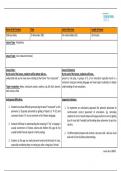Other
TEFL Assignment 1 Vocabulary Lesson Plan- At a Restaurant
- Course
- Institution
This assignment has been developed by an experienced English tutor and English native speaker. It received a pass at first submission and high praise from the assessor. The assignment is well researched with references included. The lesson plan includes a variety of activities and a good mix of tea...
[Show more]



